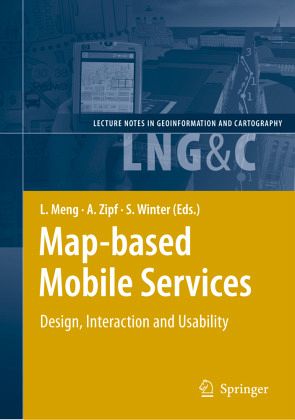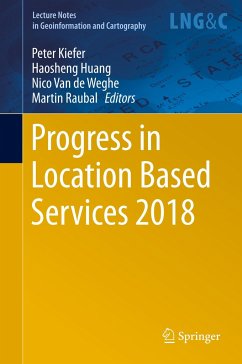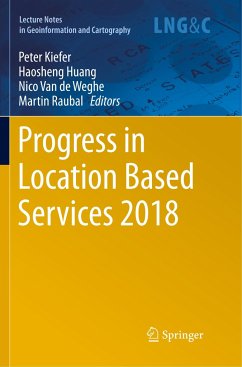
Map-based Mobile Services
Design, Interaction and Usability
Herausgegeben: Meng, Liqiu; Zipf, Alexander; Winter, Stephan
Versandkostenfrei!
Versandfertig in 6-10 Tagen
113,99 €
inkl. MwSt.

PAYBACK Punkte
57 °P sammeln!
The worldwide popularisation of mobile communication technologies and the incre- ing awareness of usability issues since 1990's have been urging map designers to s- cialise and extend cartographic semiotics, visualisation styles and map use techniques for mobile contexts and small display devices. As a follow-up to the first book "M- based Mobile Services - Theories, Methods and Implementations" published in 2005, this new one is devoted to design strategies, user interactions and usability issues. It addresses methods and techniques for topics that range from design and rendering, context mod...
The worldwide popularisation of mobile communication technologies and the incre- ing awareness of usability issues since 1990's have been urging map designers to s- cialise and extend cartographic semiotics, visualisation styles and map use techniques for mobile contexts and small display devices. As a follow-up to the first book "M- based Mobile Services - Theories, Methods and Implementations" published in 2005, this new one is devoted to design strategies, user interactions and usability issues. It addresses methods and techniques for topics that range from design and rendering, context modelling, personalisation, multimodal interaction to usability test. Instead of striving for a seamless coverage of all essential theoretical and technical issues with an equal depth and extent, we attempt to pinpoint a number of research highlights and representative development activities at universities, research institutions and so- ware industry. The operational prototypes and platforms reported in the book are on the one hand outcome and feasibility proof of various approaches. On the other hand, they serve as a new starting point for the refinement of user interfaces and iterative usability tests. The book is intended not only for cartographers, surveying engineers and g- information scientists engaged in the development of location-based services, but also for software engineers and cognitive scientists working with interface design and - ability assessment. In addition, we try to provide a number of real-life case studies for students, academics and practitioners from GIS, computer graphics and other relevant disciplines.












